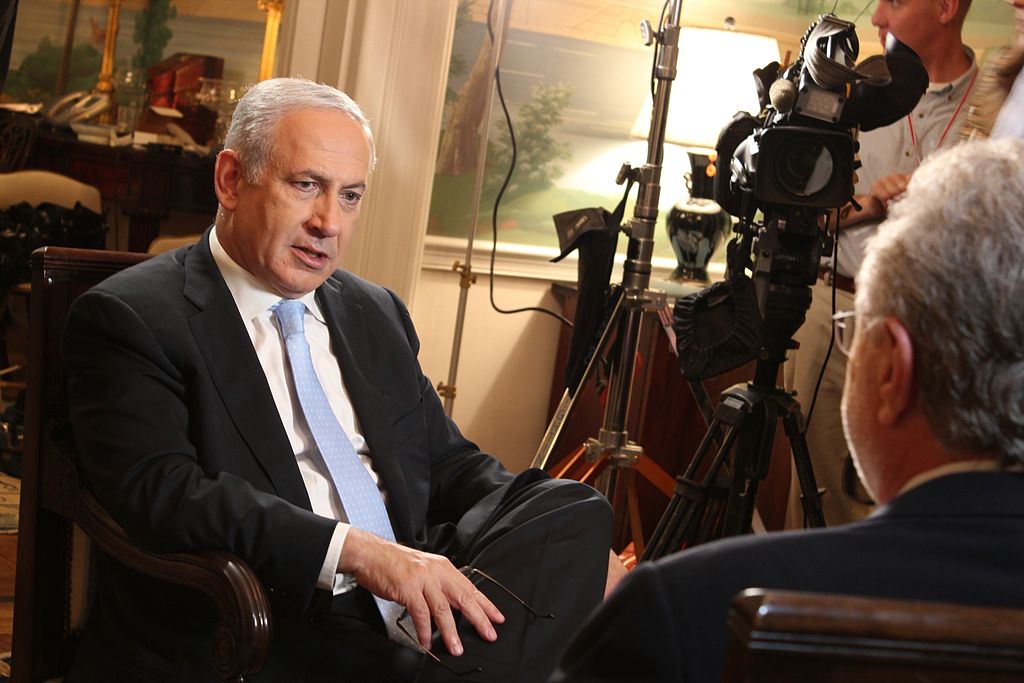On November 9, Israeli Prime Minister Benjamin “Bibi” Netanyahu returns to Washington, this time to the White House at the invitation of Barack Obama. Netanyahu’s previous trip, in early March of this year, was a foreign policy coup for Speaker of the House John Boehner, who invited Netanyahu to address Congress without consulting the White House––and an affront to the president, who by constitutional mandate is responsible for conducting the nation’s foreign policy.
If the March visit was an embarrassment for Obama, who declined to see Netanyahu, it was a political high point for Netanyahu, at home in Israel and among American Zionist Jews fiercely opposed to the nuclear non-proliferation agreement Secretary of State John Kerry had negotiated with his Iranian counterpart.
Netanyahu began his visit on March 2, with a speech to the American Israel Public Affairs Committee, a predicate for his appearance before Congress the following day. There was no daylight between members of Aipac, for half a century the dominant
American pro-Israel organization, and Netanyahu, who implied in his speech that Obama was blind to the grave security threats Israel faces every day.
America lives in one of the world’s safest neighborhoods. Israel lives in the world’s most dangerous neighborhood. America is the strongest power in the world. Israel is strong, but it’s much more vulnerable. American leaders worry about the security of their country. Israeli leaders worry about the survival of their country.
The Israeli prime minister described occasions when Israel had resorted to unilateral military action despite warnings from American presidents, and stated that Israel was prepared to act alone to stop Iran from acquiring a nuclear weapon.
The following day, Netanyahu used his speech before a joint session of Congress to characterize the Iran deal that his “good friend, Secretary of State John Kerry” was concluding in Vienna as a betrayal.
The Washington-Tehran accord would turn the Middle East into “a nuclear tinderbox” in which Israel would “face a much more dangerous Iran, a Middle East littered with nuclear bombs, and a countdown to a potential nuclear nightmare.”
The two speeches were a prelude to six months of even more bellicose warnings from Netanyahu, complemented by a $30 million ad campaign by Aipac aimed at the general public, but more specifically, at Democratic members of Congress supporting the Iran Agreement. (There was never a doubt about Republicans; all 333 Republican senators and representatives opposed the pact.)
On September 2, two weeks before the deadline for a vote on the nuclear deal with Iran, Senator Barbara Mikulski, the Maryland Democrat, announced she would provide the critical 34th vote––needed to ensure that the Republican majority could not override a presidential veto of a resolution of disapproval. On September 8, support in the Senate reached critical mass as Democratic Senators Gary Peters (Michigan), Richard Blumenthal (Connecticut) and Ron Wyden (Oregon) announced their support, providing the 41 votes that would keep the anti-accord resolution off the Senate floor. (Blumenthal and Wyden are both Jewish and had been under enormous pressure.)
Netanyahu’s––and Aipac’s––failure was complete and irreversible. Israel and the Washington advocacy group that had been doing its heavy lifting since 1963 had misread the historical moment.
J Street, the progressive pro-Israel organization founded by former Clinton White House staffer Jeremy Ben-Ami seven years ago, had prevailed, working the Congress and spending a mere $3.5 million on an ad campaign to counter Aipac’s $30 million.
Along with other progressive organizations––including Jewish Voice for Peace, Americans for Peace Now, and Ameinu––J Street achieved something as unprecedented as Bibi’s speech before Congress. It redefined what it means for American Jews to be pro-Israel.
The claim that to be Jewish means to support Israel had been a core principle of the Israel lobby. It is no more. Netanyahu and Aipac had so overplayed their hands that they changed that formula. By the end of their collaborative anti-accord campaign, 57 percent of American Jews supported the Iran nuclear deal, a higher percentage than in the general population. And most Jewish members of Congress stood behind the president.
As Helena Cobban reported in these pages, and as CIA veteran and Georgetown professor Paul Pillar has written, Netanyahu’s bellicose threats had pushed the negotiators in Vienna toward a consensus. The excesses of Netanyahu and Aipac had also frightened Congressional Democrats into lining up behind the Washington-Tehran accord.
It was a dramatic political loss for Israel. And for Netanyahu, who this month will find Washington a different place than the city he visited in March.
Photo Credit: Israel in USA







I write as someone who supports Israel as well as the non-proliferation agreement, and who has subscribed and given subscriptions to the print edition of The Washington Spectator for many years. Don’t gloat; this was a tough decision for any liberal American, whether Jewish or not, whether in Congress or not. The hyperbole of “The Israel lobby is rapidly loosing (sic) its grip” may be an overreading of an isolated though important event.
It was not a tough decision at all, for anybody — it was the only decision possible under the circumstances. It would have been impossible to maintain a united front against Iran if the Republicans had managed to undercut Obama and scuttle the deal. The rest of the world sees the Republicans for exactly what they are.
So, did they mean “losing it’s grip”? Meaning they lost some of their grip?
Loosing means to loosen, or make loose, opposite of tighten..
Their grip may be looser, but I don’t think they wanted it to be..
Just asking for a friend..
I for one am very tired of hearing about Bibi Netanyahoo. Don’t really know where the Bibi came from but whatever, he is way in over his head in the big picture. He truly is a yahoo.